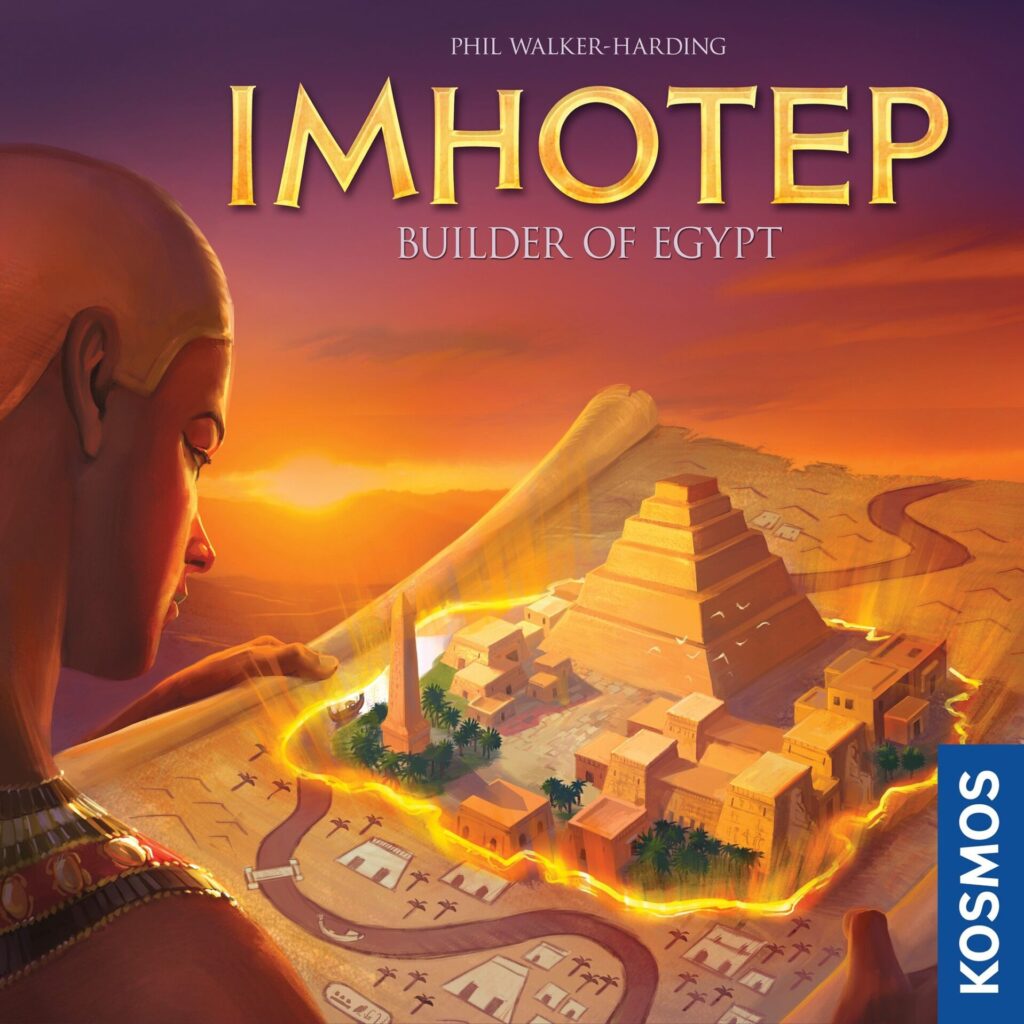How To Play: Imhotep – Setup, rule summary and strategy
Embark on your gaming journey in 'Imhotep' equipped with our guide. Master the intentional dance of resource management, hone the craft of ship placement, and disrupt your opponents' strategies wisely. Implement these tactics effectively to shape your path to victory while thoroughly enjoying the intricate world of 'Imhotep'.

Overview
Welcome to the strategic depths of ‘How To Play Imhotep,’ where ancient construction meets modern gameplay. This guide doesn’t just skim the surface with basic rules; it dives deep, giving you the blueprints you need to erect a triumphant campaign. You’ll uncover the cornerstone game mechanics and the cleverest strategies that put you a stone’s throw away from victory. Join me as we lay the foundations for your Imhotep dominance.
What’s in the box
- 5 Site boards
- 30 Wooden cubes (6 per player)
- 4 Ship tokens
- 1 Double-sided Market board
- 1 Scoring track
- 8 Ship cards
- 21 Market cards
- 34 Pyramid cards
- 21 Temple cards
- 21 Burial chamber cards
- 21 Obelisks cards
- 1 Black market card
- 4 Quarry boards
- 2 Supply sled tokens
- 10 Penalty point tokens
- 1 Rulebook
- 5 Gray tokens (as embalmer cover)
How To Play Imhotep: Rules Summary
Setup
Begin by assembling the market board and placing the scoring track within view of all players. Distribute four sled tokens to each player. Shuffle the Market Cards and lay out four in the marketplace. Place the stones by color near the quarry and set ships next to the board. Lastly, randomly select the first player.
Gameplay
- On your turn, choose one action: get new stones, load a stone onto a ship, sail a ship to a site, or play a Market Card.
- Ships sail to sites once loaded or through a player action; unloaded stones at sites have varied scoring.
- Keep play moving clockwise, with players contemplating subsequent moves for optimal position.
Winning
After filling all site locations after six rounds, the game ends. Each player tallies points from site buildings, stacked stones, and Market Cards. The highest scorer becomes the master builder and wins the game.
Special Rules & Conditions
- Market Cards provide special actions or bonuses that can be activated on a player’s turn.
- Blocking ships or sites can disrupt opponents and demand a shift in strategy.
- In the event of a tie, the player with the most leftover stone pieces wins.
Best Imhotep Strategies
Mastering Imhotep’s Foundation: Resource Management & Planning
Failing to plan is planning to fail, especially in Imhotep. Here’s how to excel at resource management:
Anticipate your Gathering
- Gauge upcoming stones in the quarry and align your turns effectively.
- Plan your moves to match; consider multiple turns ahead.
Optimize Cargo Loading
- Only load stones when they ensure maximum gain or thwart opponents.
- Avoid overcommitting to a ship; flexibility is crucial.
- Building at the right moment is pivotal, so plan your placements.
- Watch competitors to predict ideal timing.
- Begin placing stones on ships bound for valuable spots.
- Prioritize ships heading to sites aligned with your strategy.
- Block opponents by misdirecting ships thought be theirs.
- Bluff stone placements to draw out opponents’ plans.
- Delay placement to capitalize on opponents’ forced moves.
- Launch ships tactically, optimizing your own scoring opportunities.
- Force competitors to export early by threatening the boats they aim to load.
- Unload ships strategically to give opponents unwanted goods or sites.
- Play action cards that complicate their next move.
- Secure vital boat spots to limit options for final scoring opportunities.
- Use leftover resources to hinder their last turn efficiencies.
Seize Building Opportunities
Mastering the Waves: Optimal Ship Placement in Imhotep
Finding success in Imhotep mandates calculated ship placement. How you position your stones on the ships can be a decisive factor in racing ahead of your opponents on points. Couple foresight with adaptability for optimal results.
Strategic Loading
Blocking and Bluffing
Seize Timing
Outmaneuvering the Opposition: A Disruption Guide
To dominate in ‘How to Play Imhotep’, not only must you craft your strategy but also pay close attention to throwing your opponents off their game. Here’s how:
Early Game Sabotage
Mid-Game Misdirection
Late-Game Lockdown
Forge Your Path to Victory in Imhotep
As we wrap up our strategic exploration of Imhotep, remember the pyramids were not built in a day. Success in this game mirrors the feats of the ancients—requiring a blend of patience, foresight, and adaptability. While we’ve delved into optimal resource management, shrewd ship placement, and the subtle art of disrupting your opponents, the true spirit of the game lies in how you tailor these strategies to your own style. Break ground on your ideas, take pleasure in constructing your strategy, and watch as your monuments to victory rise. Until our next game night, may you build wisely and win often!
Want to know what we think of Imhotep? Read our detailed review of Imhotep here

